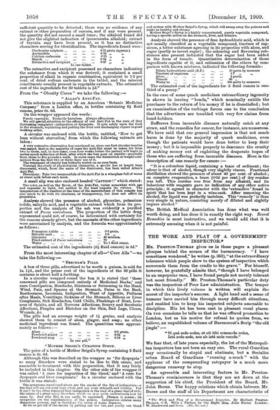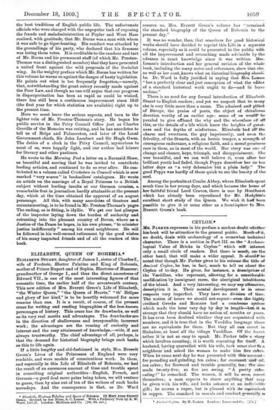THE WORK AND PLAY OF A GOVERNMENT INSPE CTOR.*
Ms. PRESTON-THOMAS. gives us in these pages a pleasant glimpse behind the scenes of the bureaucracy. "I have sometimes wondered," he writes (p. 3(13), "at the extraordinary tolerance which people show to the system of inspection which surrounds them from the cradle to the grave." For himself, however, he gratefully admits that, "though I have belonged to an unpopular race, I have found people not merely tolerant but most friendly." Mr. Preston-Thomas's particular duty was the inspection of Poor Law administration. The temper in which this lively volume is written will explain the secret of the inspector's-success. A light hand and a sense of humour have carried him through many difficult situations, and enabled him to keep his inspected subjects amenable to discipline. His lot has been cast in pleasant rural places. On two occasions he tells us that he was offered promotion to London, but as his motive for refusal he quotes from, we believe, an unpublished volume of Bureaucrat's Scrip "the old jingle"
"Si qua Bede sedes, et sit tibi antuncoia-sedes,
Ista sedesede, nee ab istd soda recede."
We fear that, of late years especially, the lot of-theMetropoli- tan inspectors has not been an easy one. The rural Guardian may occasionally be stupid and obstinate, but a Socialist urban Board of Guardians "running a-muck " with the applause of the compounding ratepayer is a much more dangerous runaway to stop.
An agreeable and interesting feature in Mr. Preston- Thomas's reminiscences is that they are set down at the suggestion of his chief, the President of the Board, Mr. John Burns. The happy relations which obtain between Mr. Burns and the staff of his Department are characteristic of
The Work and Map of a Government Inspector. By Herbert Preston- Thomas, C.B. With a Preface by- the Bight lion. John Burns. London: W. Blackwood and Sons. 1106. 51. nett
the best traditions of English public life. The unfortunate officials who were charged with the unpopular task of exposing the frauds and maladministration at Poplar and West Hain realised, with gratitude, that Mr. Burns was a man with whom it was safe to go tiger-hunting. His conduct was attacked by the groundlings of his party, who declared that his firmness was losing them votes. It is creditable to the candour and tact of Mr. Burns and his permanent staff (of which Mr. Preston- Thomas was a distinguished member) that they have presented a united front against the wild proposals of the Socialist wing. In the weighty preface which Mr. Burns has written for this volume he warns us against the danger of hasty legislation. He points out what is too frequently forgotten,—namely, that, notwithstanding the great outcry recently made against the Poor Law, and though no one will argue that our progress in dispauperisation has been as rapid as could be wished, there has still been a continuous improvement since ISIS (the first year for which statistics are available) right up to the present time.
Here we must leave the serious aspects, and turn to the lighter vein of Mr. Preston-Thomas's story. He began his public service in the Privy Council Office just as Charles Greville of the Memoirs was retiring, and he has anecdotes to tell us of Helps and Palmerston, and later of the Local Government chiefs, Sir John Lambert and Sir Hugh. Owen. The duties of a clerk in the Privy Council, mysterious to most of us, were happily light, and our author had leisure for literary and other pastimes.
He wrote to the Morning Post a letter on a Barmaid Shaw, so beautiful and moving that he was invited to contribute leading articles, and continued to do so ever after. He con- tributed to a volume called Cricketers in Council which, is now marked "very. scarce" in booksellers' catalogues. He wrote, an article on the marriage of a Royal Princess to a British subject without hurling insults at our German cousins,, a remarkable.feat in journalism hardly attainable at the present day, which at the time obtained the approval of an august. personage. All this, with many anecdotes of theatres and. mountaineering, is to be found in Mr. Preston-Thomas's pages The ending, as is fitting, is idyllic. We get our last glimpse of the inspector laying down the burden of authority and retreating into the pleasant country of Devon, where: mos Justieeof the- Peace he hopes, in-his own phrase, "to minister justice, indifferently" among his rural- neighbours. He will be followed in his well-earned retirement by the good- wishes. of his many inspected friends. and of all the readers of this book.



















































 Previous page
Previous page